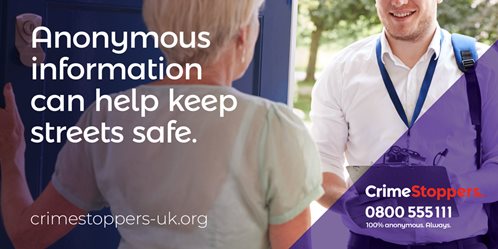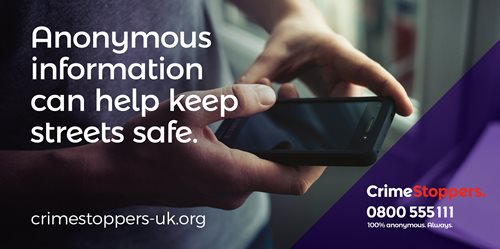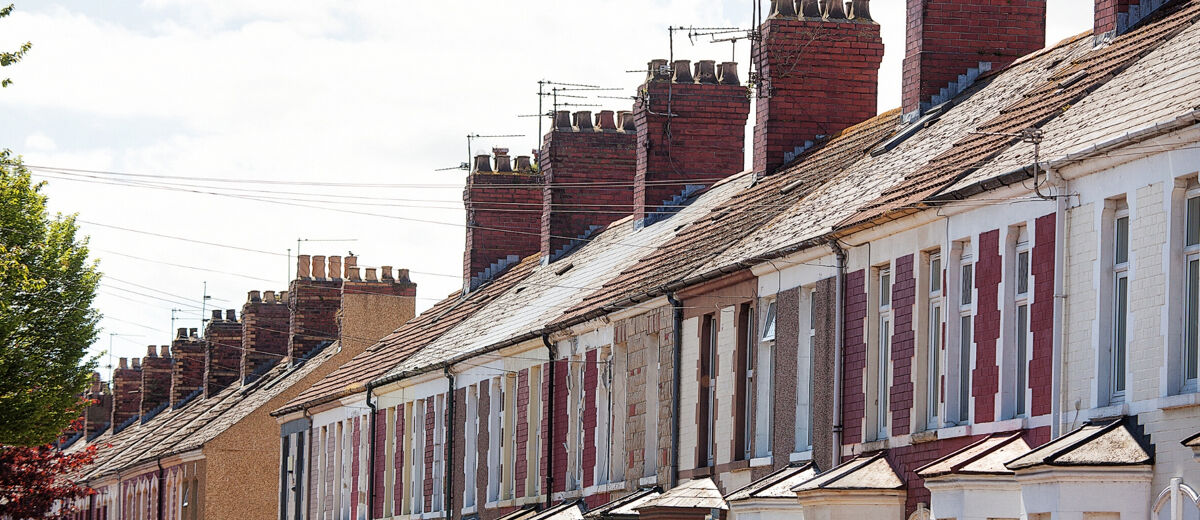Crimes against communities

People in communities can help keep streets safe.
It's well-known that cybercrime and fraud are on the increase. Click here to learn how to protect yourself from falling victim, online and off.
read about cyber security and crimes, and how to stay safe.
Have you seen anything crime-related on your street? Perhaps it’s unsettling you, maybe you know what you’ve seen is crime-related - or it could just seem suspicious. Burglaries and theft don’t just cost you money, they can be very upsetting too.
You can help solve crimes by speaking up about what you know.
Contact our charity and remain anonymous, online or on the phone, 24/7, 365 days a year. We’ve kept our promise of anonymity since we were founded in 1988.
With your help we’ve helped reunite people with stolen goods, made communities safer and brought people to justice.
Tell us about:
- Someone who's committing burglaries in your area
- Planned break ins – where and when
- Gangs who target vulnerable victims
- Who’s selling stolen goods, and where
- People who steal car keys from homes, and then their cars
- The motives of those who carry out thefts and use weapons
- Unexplained wealth on your street
- If you see lots of visitors to a neighbour’s house at unusual times
Protect yourself
There are plenty of proven ways to reduce the likelihood of becoming a victim of these crimes. Our friends at Victim Support and Neighbourhood Watch have lots of information on their websites.
Learn more about theft and burglaries which affect communities:
Victims are often reluctant to report crimes, either through embarrassment, or fear of losing their independence - and in some cases are unaware they are a victim.
Everyone has the right to feel safe where they live; you can be their voice to speak up.
If you have been a victim of any of the below crimes, contact the police on 101. In an emergency, always dial 999.
There are many types of doorstep crime, including:
- Bogus callers exploit vulnerable people within their own homes to steal cash/valuables or carry out fraudulent schemes
- Rogue traders cold call at homes and overcharge for unnecessary work, damage property deliberately and use intimidating behaviour to extort money.
- Distraction burglary is when a person tries to gain access to your home by trying to trick you into believing they need help or are officials in the area. Very often they will operate in pairs, so one attempts the distraction whilst the other one takes the opportunity to steal things in your home.
Perpetrators are often travelling criminals or members of gangs.
If you know someone who may have been a victim of doorstep crime and you don’t want to talk to the police, contact us 100% anonymously.
Something is classed as a robbery when force is used or threatened against someone in order to steal from them.
If you've witnessed a robbery or have information regarding stolen goods, contact us today. You'll remain 100% anonymous. Always.
Burglary is when the perpetrator has illegally entered a building with intent to commit a crime, especially theft. This could be your home, shed or garage. A burglary could result in vehicle theft - thieves have been known to take car keys from properties and come back at a later date to take the vehicle.
Learn more about how to protect your property and possessions here.
If you have information regarding a burglary and don’t want to talk to the police, contact us online or on the phone. You will remain 100% anonymous. Always.
Also known as relay theft, keyless car theft is where the signal from a key for a “keyless entry” car is captured by somebody standing outside the victim’s house using a device.
1 in 50 bicycle-owning households are victims of cycle theft each year.
For more advice on how to protect your bike, visit Bike Register, where you can join the UK’s national, police-approved, bicycle marking & registration scheme:
Advice: bikeregister.com/advice/top-tips-to-protect-your-bike.
Meter cheating means tampering with the meter so it doesn’t record how much gas or electricity is being used, or trying to bypass the meter completely. This is theft, and can lead to a fine or prison sentence. It’s also dangerous, and risks serious injuries to innocent people and major damage to property.
To learn more about the signs to spot and to report energy theft, visit stayenergysafe.co.uk.
Learn more about other crimes which target vulnerable people:
- Cuckooing is a form of crime where drug dealers take over the home of a vulnerable person in order to use it as a base for drug dealing.
- Modern slavery Despite slavery being abolished over 150 years ago, it’s believed that there are more people enslaved today than at any time in our history. Modern slavery takes a number of forms, often including sexual exploitation and forced labour.
You can help to keep the streets in your community safe by helping to promote our services locally. Here are some images formatted for social media; right click to save them. If you're on your phone or tablet, press and hold on the images and either save or share them direct. Thank you.
X images


Facebook images


Useful links
- Metropolitan Police Stay Safe page
- Police Scotland Keep Safe page
- Get Safe Online page
- National Cyber Security Centre cyber security page
- National Domestic Abuse Helpline - 0808 2000 247
- Male Victims of Domestic Abuse National Helpline - 01823 334244
- National LGBT Domestic Abuse Helpline - 0800 999 5428
- National Stalking Helpline - 0808 802 0300
- Bright Sky is a free mobile app and webpage, that supports anyone who may be in an abusive relationship or those concerned about someone they know. It’s available in English, Welsh, Urdu, Punjabi and Polish. Visit the website: www.bright-sky.org.uk or click here to download the app via Apple, or here to download the app via Google Play. Remember, only download the app or visit the webpage if it is safe for you to do so.

Give information
Give information anonymously by phone on 0800 555 111 or online

Donate to us
Join our fight against crime by making us a donation today, and see how the money you give can help shape your community for the better.

Volunteer
Every year we stop thousands of crimes. Let’s help make communities safer together. Join us and start volunteering with your local Crimestoppers team today.
